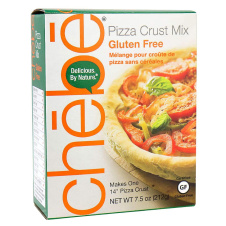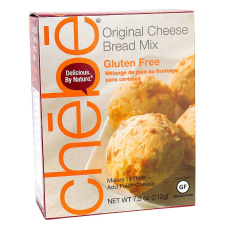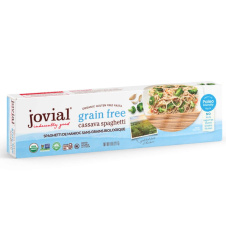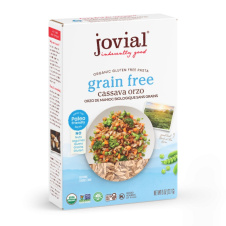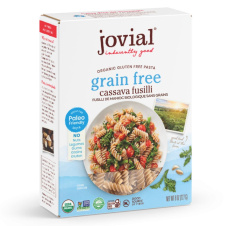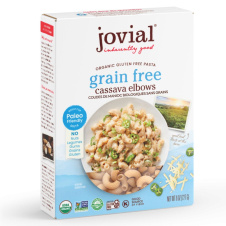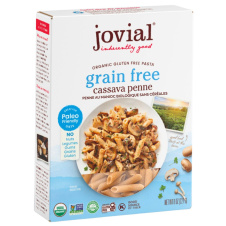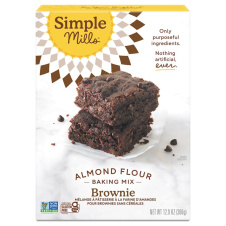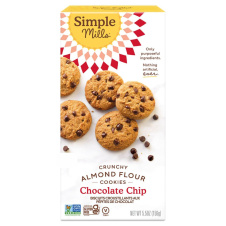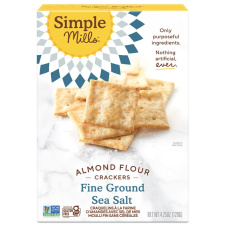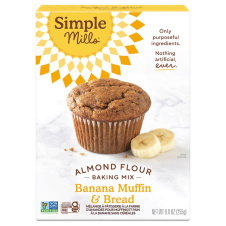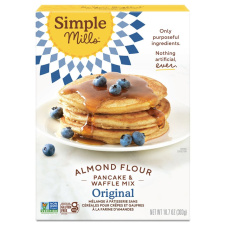Affichage navigation

Benefits of a Grain-Free Diet
No Grain, No Pain! Learn why eliminating all grains from your diet may help to improve your overall health and how you can still enjoy all of your favourite foods too - Yes, we're talking pasta, pizza and baked goods!
Many of the food items found in our diets today are composed of grain-derived ingredients, which can make the choice to go grain free a little bit of an intimidating diet change. However, the grains found in many of the foods we consume, could be an underlying contributor or factor to a health issue that you may be experiencing. And saying no to them completely might be the change you need to improve your health and wellbeing, and ultimately your quality of life!
Eliminating grains from your diet is becoming a lot more popular in recent years. We know that it might seem a bit challenging at first to go grain free, they’re pretty much in EVERYTHING! But don’t panic yet, we’re here to not only provide you with the benefits of a grain free diet (and why no grain no pain might be your new motto), but also assist you in creating your grain free diet plan with loads of options for grain free substitutes and alternatives as well!
Trust us when we say, these new additions to your meal plan can be just as delicious and tasty as their wheat counterparts and may leave you feeling a lot lighter, healthier and happier.
What Grains Should I Avoid?
In the shortest answer, all of them! Many of the grains found in our diets are derived from the seeds of grass-like plants called “cereals”. Depending on whether they are processed or not, determines if they are classified as a “refined grain” or a “whole grain.”
It is important to note that a grain free diet is different from a gluten free diet, as all grains, not just gluten containing grains, are eliminated. Natura Market recognizes the following gains as prohibited on a grain free diet: wheat, rye, barley, spelt, sprouted grains, triticale, millet, amaranth, rice, oats, dried corn and sorghum.
However, we understand that there is a grey area with the restrictions on this diet and that buckwheat and quinoa may be considered a grain by some people and not by others. Choosing to consume these “grains” can be at your own individual discretion and based on how your body feels when you eat them.
What food items should I avoid on a Grain Free Diet?
As previously mentioned, grains often make up the majority of carbohydrates we consume on a daily basis. They can be found in, but are not limited to, the following:
- Cereal, granola, muesli and oatmeals
- Rice, pastas and pasta noodles
- Baked goods, such as breads, bagels, tortillas, muffins and cookies
- Many snacks, such as crackers, popcorn, rice cakes, tortilla chips and granola bars
- Many of the baking flours we use, as well as many starches used in cooking too
Grains can even be found in lesser obvious food items:
- Dairy-free milk alternatives, as they may be rice or oat based
- Meat replacement and vegetarian/vegan substitutive food items, such as vegetable “burgers”
- High-fructose corn syrup and rice/malt syrup
So is a Grain Free Diet a Carb Free Diet?
The simple answer is no. A grain free diet does not restrict your carbohydrate intake, much like other diets do (i.e Ketogenic or Paleo diet). However, by eliminating grains from your diet, it can alternatively mean that you are consuming less carbs, therefore making it a naturally lower-carb diet by default.
However, complex carbohydrates, such as beans and legumes, fruits and both starchy and green vegetables, can be enjoyed with no restriction while on a no wheat diet.
Who could benefit from a Grain Free Diet?
While the grain free diet is fairly new and has not been as widely studied as other widely popular food restriction diets (ie the gluten free diet or the paleo diet) it is gaining popularity due to the positive impact it has on a variety of Autoimmune diseases, as well as other health conditions.
What are the benefits of a Grain Free Diet?
1. Going grain free may assist in reducing symptoms of a chronic health issue or concern
If you’re currently dealing with a chronic health condition, eliminating grains from your diet might help to alleviate the symptoms you are experiencing or minimize the effects of the condition, in terms of severity. Eliminating grains from your diet could assist in improving your quality of life and make living with the condition more manageable.
Grain free diets have been shown to improve the effects of the following:
- Lupus
- Crohn’s disease
- Arthritis
- Multiple sclerosis
- Diabetes
- Fibromyalgia
- Graves disease
- Ulcerative colitis
- Antiphospholipid syndrome
- Pemphigus vulgaris
- Irritable bowel syndrome
Positive improvements have also been shown in those with autism, depression, alzhiemers, eczema, thyroid disease and obesity as well.
2. Grain free might mean you have more energy!
If you find yourself constantly running on low energy and oftentimes hit a roadblock of feeling sluggish in the middle of the day, the food you are eating, especially if they are grain-based, could be a contributing factor. Grains, especially those that are refined or highly processed, often lack beneficial nutrients, tend to be higher in carbohydrates and are often metabolized quickly. This leads to a spike in your blood sugar and resulting in you feeling hungry, not properly fueled and tired due to the lack of nutrients your body hasn’t received. By introducing a no wheat diet, it encourages you to consume foods that are more nutrient rich, longevity filling and therefore, providing you with adequate energy for the day.
3. No Grain No Pain: Going grain free might just mean better digestive health!
Your tummy might just thank you for going grain free! Whole grains like brown rice and oatmeal contain lectins (naturally occurring proteins found in many plants), which can cause inflammation in the lining of your stomach, causing discomfort. Refined grains typically lack in fibre, which can affect regular bowel movements and cause constipation. They have been linked to leaky gut syndrome and the cause of many food sensitivities. By eliminating grains from your diet, you could improve your digestive health, especially if you are someone with Crohn's Disease, IBS and Ulcerative Colitis.
4. Eliminating grains from your diet could reduce belly fat and spark weight loss
Oftentimes, many grain-based food items are high in carbohydrates and thus result in a higher calorie content as well. Foods made with refined grains leave us feeling full, but in terms of longevity, you do not feel full for long. Which can result in feeling hungry quicker, overeating or continuous snacking. By choosing to go grain free, you are encouraged to eat more nutrient dense foods, which will help you to feel fuller for longer, which could assist in weight loss and reduction of belly fat.
4. Boost your mental health by going wheat free
While consuming grains does not directly cause depression, anxiety and other mood related disorders, it can definitely be a contributing factor in the feelings and symptoms associated with them. This is because first and foremost, our stomach and digestive tract do have a direct impact on the rest of our body. When our digestive system does not agree with something we eat, this is when we feel those feelings of inflammation and discomfort. Our body’s reaction to food that upsets us can contribute to us feeling lethargic, down and also brain fogged. Choosing to go grain free can help to improve your mental health overall.
6. Grain free could reduce Inflammation
Refined grains have been linked to higher levels of inflammatory markers in the blood, thus making the side effects of arthritis or diabetes more difficult or unmanageable. By choosing to eliminate these refined grains from your diet, you could potentially see an decrease in “flare ups” or inflammation.
7. Kicking grains to the curb could lower your cholesterol (and have other positive heart benefits as well!)
Choosing to go wheat free might leave your heart singing a happy tune! Refined grains contain very little fibre. The overconsumption of refined grains found in many processed foods, could be having negative effects on your cardiovascular system or be contributing to cardiovascular diseases, such as heart attacks, stroke and heart disease. By choosing to remove grains from your diet and substituting with more fibre and nutrient rich foods, you could help to lower your cholesterol levels or overall assist in improving your overall heart health.
8. A Grain Free diet encourages home cooking (and for you to read the labels)
In this day and age of delivery food services, fast food and ready-to-eat meals, processed foods have become more of the norm. Oftentimes when we are looking for something quick, we aren’t reading into the ingredients and the nutrition facts before we consume. By choosing to make modifications to your diet, such as eliminating grains, it then forces you to reevaluate your overall experience with food, resulting in more at home cooking, label reading and seeking to educate yourself on the foods you are choosing to put in your body!
9. Saying goodbye to grains could reduce high blood sugar levels
When carbohydrates are consumed, they are broken down into sugars and enter the bloodstream. As we have mentioned, grains are the main source of carbohydrates in our diets and are often overconsumed. This overconsumption could be the contributing factor to higher than normal blood sugar levels. By choosing to eliminate grains from your diet, you could be substantially lowering your carb intake and in turn aiding in reducing your blood sugar levels.
You may be wondering, are there any downsides to a Grain Free diet I should know about?
Now, when considering any change or modification to your diet of any kind, there will always be some downsides to take into account. There are a few things that need to be considered (and can be expected) when choosing to eliminate grains from your diet. You may see:
- An increase in constipation. Eliminating whole grains (which are high in fibre) could result in a lower fibre intake. Ensuring to incorporate alternative fibre rich foods into your diet could alleviate any experience of constipation. Fibre rich foods include beans and legumes and some fruits and vegetables.
- Nutrient deficiencies. As with any diet restriction, deficiencies could result if you are not properly balancing or substituting for these lost nutrients. Ensuring you are eating foods rich in Vitamin B, zinc, iron, magnesium and antioxidants (or taking supplements to assist in ensuring you are receiving proper nutrition) is the best way to prevent these deficiencies
What Can I Eat on a Grain Free Diet?
So you’re probably thinking, what can I eat on a no wheat diet?? Although we have acknowledged that grains do make up many of the foods in our everyday diets, a grain free diet is still less restrictive than many of the other diets out there.
Here is a list of what you can eat on a grain free diet:
- Meat and meat alternatives, such as beans and legumes
- Dairy and dairy-based products
- Vegetables and fruits
- Sugar and sweeteners
- Complex carbohydrates
- Nuts and seeds
- Grain-free substituted food items
What are some Grain Free Substitutions/Alternatives?
Luckily due to the uprise in gluten free diets, paleo diets and grain free diets, there are many grain free substitutes and alternatives available, making this health and lifestyle change much easier and less restrictive than it has been in the past. Food substitutions like cauliflower pastas and pizza crusts, alternative flours made from almond and coconut, grain free crackers and grain free cookies, just to name a few, are all delicious, grain free ways to still enjoy some of your favourite snacks and meals!
Here are some yummy grain-free items to add to your next shopping order:
For Cooking:
- Spaghetti: Jovial Organic Grain-Free Cassava Spaghetti
- Angel hair pasta: Banza Chickpea Pasta Angel Hair
- Pizza crust mix: Chebe Grain-Free Pizza Crust Mix
- Rice: Nature's Earthly Choice Cauliflower Rice
- Taco seasoning: Siete Taco Seasoning Mild
- Soup: Kettle & Fire Mushroom Chicken Bone Broth
- Taco shells: Siete Grain Free Taco Shells
- Lasagna: Jovial Organic Gluten-Free Brown Rice Pasta Lasagna
- Noodles: Better Than Foods Organic Konjac Noodles
- Taco Tortillas: Siete Almond & Cassava & Coconut Flour Tortillas Variety
- Rotini: Cybele’s Free to Eat Superbfood Grain-Free Rotini White Veggies
- Premade pizza crusts: Cali'flour Foods Cauliflower Pizza Crust - The Original Italian
For Breakfast:
- Pancakes: Purely Elizabeth Grain-Free Pancake Mix
- Cereal: Nuco Coconut Crunch Cereal
- Dairy-free milk alternative: Milkadamia Unsweetened Macadamia Milk
- Dairy-free creamer alternative: Nutpods Caramel Unsweetened Dairy-Free Creamer
- Chocolate chip pancake and waffle mix: Birch Benders Chocolate Chip Keto Grain-Free Pancake & Waffle Mix
- Granola: Wildway Grain-Free Granola Coconut Cashew
For Baking:
- Brownies: Otto's Grain-Free Classic Brownie Mix
- Baking flour: Ecoideas Organic Tigernut Flour
- Bread: Chebe Grain-Free All-Purpose Bread Mix
- Chocolate chip cookies: Simple Mills Grain-Free Almond Flour Baking Mix Chocolate Chip Cookie
- Almond flour: Bob's Red Mill Super Fine Almond Flour
- Pumpkin muffins: Simple Mills Grain-Free Almond Flour Baking Mix Pumpkin Bread
- Coconut flour: Bob's Red Mill Organic Coconut Flour
- Banana bread: Simple Mills Grain-Free Almond Flour Baking Mix Banana Bread
- Cinnamon rolls: Chebe Grain-Free Cinnamon Roll Mix
- Cassava flour: Otto's Naturals Cassava Flour
- Cake mix: Simple Mills Grain-Free Almond Flour Baking Mix Vanilla Cake
- Tapioca flour/starch: Bob's Red Mill Tapioca Flour / Starch
For Snacking:
- Chips: Barnana Organic Ridged Grain-Free Plantain Chips Vinegar & Sea Salt
- Veggie Stix: Lesser Evil Grain-Free Veggie Sticks Himalayan Pink Salt
- Cookies: Rule Breaker Allergen-Free Chocolate Chunk Blondies
- Crackers: Hu Grain-Free Crackers Everything
- Crisps: Rhythm Superfoods Organic Cauliflower Bites Sea Salt
- Banana bread: Simple Mills Grain-Free Soft Baked Almond Flour Bars Nutty Banana Bread
- Pita crackers: Simple Mills Grain-Free Veggie Pita Crackers Mediterranean Herb
- Chocolate covered cookies: Emmy's Organic Grain-Free Chocolate Covered Coconut Cookie Bites Vanilla
- Cake in a cup: Birch Benders Grain-Free Keto Cake a la Cup Birthday Cake
- Nacho chips: Siete Nacho Grain Free Tortilla Chips
We’re here to help you! We have filters in place on our website for you to cater your shopping experience to your needs, which eliminates the added time spent sifting through hundreds of products to determine if the item is suitable for you!
How do I know the Grain Free diet is right for me?
As you would with any diet or health change, we suggest talking to your doctor or naturopath before making any lifestyle changes and decisions. They can help you to determine if a grain free diet is best for you. More importantly, listen to your body and how it is reacting to the foods you choose to eat (or in this case, not eat) and raise any concerns.
How can I monitor how I feel on the Grain Free Diet?
There are a few great ways to monitor how you feel and how your body is reacting to a new diet change. We suggest starting a food journal or using an app, such as MyFitnessPal or MyFoodDiary, which lets you log food consumption, as well as how you feel physically and emotionally each day.
The grain free diet isn't for everyone! And we understand that as with any diet change, it can be intimidating to make the choice of change. However, if you’ve noticed your body reacting negatively to grains recently or if you’re seeking to make a positive health or lifestyle change, eliminating wheat from your diet might be the solution you are looking for!









